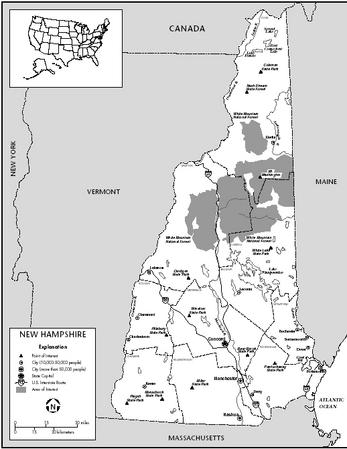New Hampshire
History
The land called New Hampshire has supported a human population for at least 10,000 years. Prior to European settlement, Indian tribes of the Algonkian language group lived in the region. During the 17th century, most of New Hampshire's Indians, called Pennacook, were organized in a loose confederation centered along the Merrimack Valley.
The coast of New England was explored by Dutch, English, and French navigators throughout the 16th century. Samuel de Champlain prepared the first accurate map of the New England coast in 1604, and Captain John Smith explored the Isles of Shoals in 1614. By this time, numerous English fishermen were summering on New England's coastal banks, using the Isles of Shoals for temporary shelter and to dry their catch.
The first English settlement was established along the Piscataqua River in 1623. From 1643 to 1680, New Hampshire was a province of Massachusetts, and the boundary between them was not settled until 1740. During the 18th century, as settlers moved up the Merrimack and Connecticut river valleys, they came into conflict with the Indians. By 1760, however, the Pennacook had been expelled from the region.
Throughout the provincial period, people in New Hampshire made their living through fishing, farming, cutting and sawing timber, shipbuilding, and coastal and overseas trade. By the first quarter of the 18th century, Portsmouth, the provincial capital, had become a thriving commercial port. New Hampshire's terrain

During the 19th century, as overseas trade became less important to the New Hampshire economy, textile mills were built, principally along the Merrimack River. By midcentury, the Merrimack Valley had become the social, political, and economic center of the state. So great was the demand for workers in these mills that immigrant labor was imported during the 1850s; a decade later, French Canadian workers began pouring south from Quebec.
Although industry thrived, agriculture did not; New Hampshire hill farms could not compete against Midwestern farms. The population in farm towns dropped, leaving a maze of stone walls, cellar holes, and new forests on the hillsides. The people who remained began to cluster in small village centers.
World War I, however, marked a turning point for New Hampshire industry. As wartime demand fell off, the state's old textile mills were unable to compete with newer cotton mills in the South, and New Hampshire's mill towns became as depressed as its farm towns; only in the north, the center for logging and paper manufacturing, did state residents continue to enjoy moderate prosperity. Industrial towns in the southern counties responded to the decline in textile manufacture by making other items, particularly shoes, but the collapse of the state's railroad network spelled further trouble for the slumping economy. The growth of tourism aided the rural areas primarily, as old farms became spacious vacation homes for "summer people," who in some cases paid the bulk of local property taxes.
During the 1960s, New Hampshire's economic decline began to reverse, except in agriculture. In the 1970s and early 1980s, growth in the state's northern counties remained modest, but the combination of Boston's urban sprawl, interstate highway construction, and low state taxes encouraged people and industry—notably high-technology businesses—to move into southern New Hampshire. The state's population doubled between 1960 and 1988, from 606,921 to 1.1 million. Most of the arrivals were younger, more affluent, and better educated than the natives. The newcomers shared the fiscally conservative views of those born in New Hampshire but tended to be more liberal on social questions such as gun control and abortion. The rise in population strained government services, prompted an increase in local taxes, and provoked concern over the state's vanishing open spaces. The state's population has held fairly steady since 1988, with an estimated 1.25 million people in 2001.
Like other New England states, New Hampshire was hard hit by the recession of the early 1990s, with the unemployment rate rising to 10% by 1992. But by the mid-1990s a recovery was underway, and about 30,000 of the more than 60,000 jobs lost during the recession had been regained. By 1999 the state enjoyed the 2nd-lowest unemployment rate in the nation—just 2.7%. Population growth in the state threatened to do away with the annual town meeting. A study released in 2000 showed that more towns had replaced the celebrated tradition with the official ballot form of governance.
In 2000 New Hampshire Chief Justice David Brock faced an unprecedented trial on charges he influenced a lower-court judge about a powerful state senator's case, allowed a Supreme Court colleague to have a say in the handling of his own divorce, permitted disqualified justices to participate in cases, and lied to a house committee investigating the court. Brock was the first New Hampshire official impeached in 210 years and his trial was to be the first in the state's history. The last impeachment of a New Hampshire official was in 1790; Supreme Court Justice Woodbury Langdon resigned before he was tried. Brock was acquitted by the New Hampshire Senate in October 2000.
Like other New England states in the early 2000s, New Hampshire faced record-breaking budget deficits. Governor Craig Benson vetoed a June 2003 two-year budget passed by the state legislature, saying it would increase the deficit and raise taxes. Benson, elected in 2002, also signed two gun control bills in 2003 that he said would protect gun ownership.